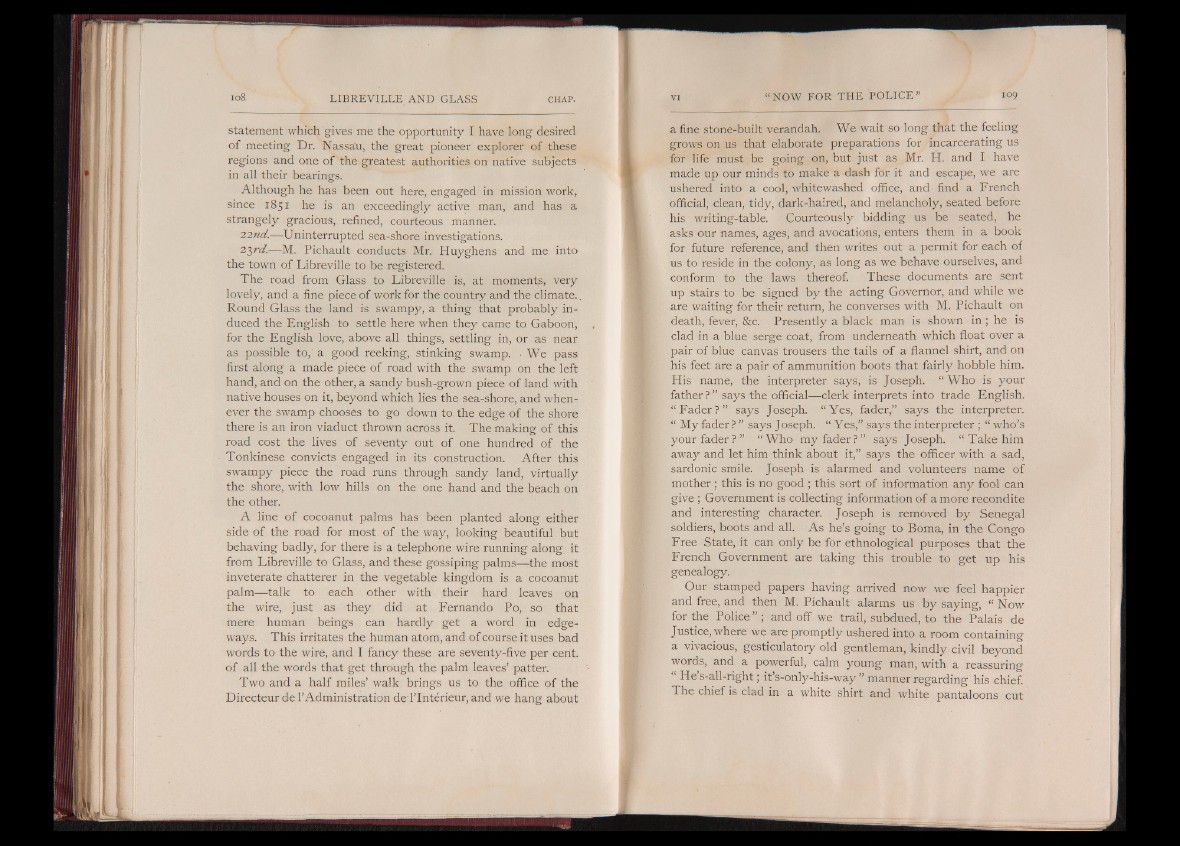
statement which gives me the opportunity I have long desired
of meeting Dr. Nassau, the great pioneer explorer of these
regions and one of the greatest authorities on native subjects
in all their bearings.
Although he has been out here, engaged in mission work,
since 1851 he is an exceedingly active man, and has a
strangely gracious, refined, courteous manner.
22nd.— Uninterrupted sea-shore investigations.
Pichault conducts Mr. Huyghens and me into
the town of Libreville to be registered.
The road from Glass to Libreville is, at moments, very
lovely, and a fine piece of work for the country and the climate..
Round Glass the land is swampy, a thing that probably induced
the English to settle here when they came to Gaboon,
for the English love, above all things, settling in, or as near
as possible to,' a good reeking, stinking swamp. • We pass
first along a made piece of road with the swamp on the left
hand, and on the other, a sandy bush-grown piece of land with
native houses on it, beyond which lies the sea-shore, and whenever
the swamp chooses to go down to the edge of the shore
there is an iron viaduct thrown across it. The making of this
road cost the lives of seventy out of one hundred of the
Tonkinese convicts engaged in its construction. After this
swampy piece the road runs through sandy land, virtually
the shore, with low hills on the one hand and the beach on
the other.
A line of cocoanut palms has been planted along either
side of the road for most of the way, looking beautiful but
behaving badly, for there is a telephone wire running along it
from Libreville to Glass, and these gossiping palmsfi-the most
inveterate chatterer in the vegetable kingdom is a cocoanut
palm— talk to each other with their hard leaves on
the wire, just as they did at Fernando Po, so that
mere human beings can hardly get a word in edgeways.
This irritates the human atom, and of course it uses bad
words to the wire, and I fancy these are seventy-five per cent,
of all the words that get through the palm leaves’ patter.
Two and a half miles’ walk brings us to the ofifice of the
Directeur de l’Administration de'l’Intérieur, and we hang about
a fine stone-built verandah. We wait so long that the feeling
grows on us that elaborate preparations for incarcerating us
for life must be going on, but just as Mr. H. and I have
made up our minds to make a dash for it and escape, we are
ushered into a cool, whitewashed ofifice, and find a French
official, clean, tidy, dark-haired, and melancholy, seated before
his writing-table. Courteously bidding us be seated, he
asks our names, ages, and avocations, enters them in a book
for future reference, and then writes out a permit for each of
us to reside in the colony, as long as we behave ourselves, and
conform to the laws thereof. These documents are sent
up stairs to be signed by the acting Governor, and while we
are waiting for their return, he converses with M. Pichault on
death, fever, &c. Presently a black man is shown in ; he is
clad in a blue serge coat, from underneath which float over a
pair of blue canvas trousers the tails of a flannel shirt, and on
his feet are a pair of ammunition boots that fairly hobble him.
His name, the interpreter says, is Joseph. “ Who is your
father ? ” says the officialS-clerk interprets into trade English.
“ Fader?” says Joseph. “ Yes, fader,” says the interpreter.
“ My fader ? ” says Joseph. “ Yes,” says the interpreter ; “ who’s
your fader?” “ Who my fader?” says Joseph. “ Take him
away and let him think about it,” says the officer with a sad,
sardonic smile. Joseph is alarmed and volunteers name of
mother; this is no good ; this sort of information any fool can
give ; Government is collecting information of a more recondite
and interesting character. Joseph is removed by Senegal
soldiers, boots and all. As he’s going to Boma, in the Congo
Free State, it can only be for ethnological purposes that the
French Government are taking this trouble to get up his
genealogy.
Our stamped papers having arrived now we feel happier
and free, and then M. Pichault alarms us by saying, “ Now
for the Police” ; and off we trail, subdued, to the Palais de
Justice, where we are promptly ushered into a room containing
a vivacious, gesticulatory old gentleman, kindly civil beyond
words, and a powerful, calm young man, with a reassuring
He s-all-right; it s-only-his-way ” manner regarding his chief.
The chief is clad in a white shirt and white pantaloons cut